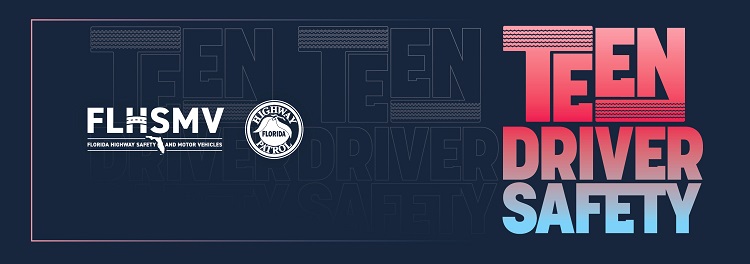Florida Recognizes National Teen Drivers Safety Week, Aims To Reduce Teen Crashes

TALLAHASSEE, Fla. – This week, the Florida Department of Highway Safety and Motor Vehicles (FLHSMV) is recognizing National Teen Driver Safety Week in conjunction with the National Highway Traffic Safety Administration (NHTSA) and public safety partners across Florida. The campaign, which runs October 17-23, aims to educate teens and their caregivers on safe driving practices and remind them of the risks and responsibilities associated with driving.
Governor Ron DeSantis issued a proclamation in observance of Teen Driver Safety Week in Florida as an opportunity to encourage everyone to help reduce injuries and tragic loss of life. Florida teens (ages 15-19) make up approximately 5% of Florida’s licensed drivers. However, crashes with teen drivers typically make up 11% of all crashes in Florida. In 2020, there were 39,150 crashes with teen drivers, resulting in 97 teen-driver fatalities statewide.
“Every year, teen drivers in Florida are involved in tens of thousands of senseless and life-altering crashes,” said FLHSMV Executive Director, Terry L. Rhodes. “Parents, caregivers and family members can set their young drivers up for success, and ultimately keep them safe, by modeling good driving behaviors, having conversations regularly with our teens about making smart decisions behind the wheel, and setting rules before allowing a teen to drive. Please help keep your teen driver safe by encouraging them to slow down and to make good decisions behind the wheel – it could save their life.”
Teens have specific driving curfews depending on their age and type of license. Parents, caregivers, and teens should know and follow their curfews for safety:
| License Type | Hours | Note: |
|---|---|---|
| Learner's License | Daylight hours for first three months after license issued - until 10 p.m. after three months |
|
| Driver License 16 years old | Driving is only allowed between 6 a.m. and 11 p.m. | Unless driving to or from work OR accompanied by a licensed driver 21+ |
| Driver License 17 years old | Driving is only allowed between 5 a.m. and 1 a.m | Unless driving to or from work OR accompanied by a licensed driver 21+ |
“National Teen Driver Safety Week is a great reminder to parents and caregivers the important role they play in creating the next generation of safe drivers,” said Lt. Colonel Troy Thompson, Acting Director of the Florida Highway Patrol. “Parents can mentor their young drivers by constantly demonstrating safe driving habits and discussing the dangers associated with speeding, impaired driving, distracted driving, and not wearing a seatbelt.”
FLHSMV is joined by its campaign partners this week to drive home the message of teen-driver safety:
“Dangerous driving habits can lead to life-threatening and fatal motor vehicle crashes for drivers of all ages,” said Florida Department of Transportation Secretary Kevin J. Thibault, P.E. “Unfortunately, motor vehicle crashes are the leading cause of death for teens in the United States. FDOT encourages parents to speak with their teens about eliminating risky behaviors behind the wheel and remind them to keep their eyes on the road and hands on the wheel – at all times.”
Stephan Dembinsky, President of the Florida Police Chiefs Association and Director of Daytona Beach Shores Police Department said, “Now more than ever, parents are nervous about their teen drivers, as there are so many distractions. While talking to your teens about safe habits is crucial, nothing speaks more clearly and loudly than setting a good example while you are driving. If your teen sees you driving aggressively, running lights or stop signs, or using your phone behind the wheel, they will think these behaviors are acceptable. Show them daily how to be an alert, cautious and courteous driver. The behavior of parents and caregivers while driving is the teaching tool that will have the most impact. Your teen driver will trust what you say is important if you back it up with actions that match your words. And don’t forget to encourage and reward positive behaviors. Show them that no text is that important, no rush to make it on time, and no other driver’s behavior is worth an accident. FPCA fully supports the National Teen Driver Safety Week and encourages parents and caregivers to use the week to both talk about the privilege of having a license and to model the responsibility of driving.”
“One of the five goals of the Florida Sheriffs Association is to promote programs and services focused on the youth of our state. One of the initiatives is the Teen Driver Safety program that many of our sheriffs provide to teach safe driving practices. As such, on behalf of our sheriffs, I endorse and fully support the efforts of National Teen Driver Safety Week being promoted by the Florida Department of Highway Safety and Motor Vehicles,” said Sheriff Bobby McCallum, President, Florida Sheriffs Association.
“One of the most important steps a parent can take with their teen is to be actively engaged in the learning-to-drive process,” said Michele Harris, Traffic Safety Consultant for AAA – The Auto Club Group. “Parents can coach their teen and help them become a safe, experienced driver through practice driving and mentoring. It is also a critical time to make them aware of responsible driving habits that reduce crash risk.”
For tips on how to talk to teens about driving safety and other campaign resources, please visit FLHSMV’s teen driver webpage.
The Florida Department of Highway Safety and Motor Vehicles (FLHSMV) provides highway safety and security through excellence in service, education, and enforcement. Florida is leading the way to A Safer Florida through the efficient and professional execution of its core mission: the issuance of driver licenses, vehicle tags and titles and operation of the Florida Highway Patrol. To learn more about FLHSMV and the services offered, visit https://www.flhsmv.gov, follow us on Twitter @FLHSMV, find us on Facebook or follow us on Instagram.

Dave Kerner, Executive Director